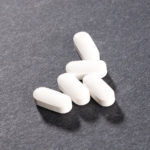By Bonnie Jenkins, Advanced Natural Wellness
Even though antioxidants get the lion’s share of attention when it comes to disease prevention, there is another shining star among plant-derived compounds—phytosterols. Similar in structure and function to cholesterol, these plant sterols benefit both heart and prostate health, and are even linked to a reduced risk of cancer.
Of course, phytosterols are best known for their ability to lower cholesterol levels. Classified as sterols and stanols, phytosterols attach to the spaces in the digestive tract usually reserved for cholesterol. As a result, less cholesterol is absorbed into the bloodstream.
There is growing evidence that eating foods like margarine that are enriched with phytosterols can lower your cholesterol levels. One recent review showed that eating enough enriched food to provide 2 grams of phytosterols per day can significantly lower total and LDL cholesterol levels, as well as triglydercides. The problem with this, however, is that it would require easting two to four tablespoons of a fortified margarine every day! Luckily, you can get plenty of plant sterols and stanols in pill form. Not only are phytosterol supplements more convenient, they are calorie free.
Men at risk or suffering from an enlarged prostate can also benefit from phytosterols. In one six month study of 200 men with benign prostatic hyperplasia (BPH), 60 mg. of a phytosterol preparation daily increased peak urinary flow and decreased post-void residual urine volume compared to a placebo. Another study of 177 men with BPH found that 130 mg. of phytosterols per day also improved urinary symptoms. (For more on beta-sitosterol’s prostate benefits, see “Splendor In The Grass” [Colleen – need the date this ran].
Then there’s cancer—or rather, the prevention of cancer. Case-controlled studies in Uruguay found that people with stomach, lung and breast cancers have lower phytosterol intakes than cancer-free control groups. Studies in the U.S. show similar results—women diagnosed with breast or uterine cancer had lower dietary phytosterol intakes than healthy women.
One study showed that a mixture of phytosterols known as beta-sitosterol significantly inhibits human breast cancer cell growth. Because of these findings, the researchers concluded that beta-sitosterol effectively kills cancer cells and including them via diet and supplements may be an effective preventive measure for breast cancer. There is also some preliminary evidence that beta-sitosterol reduces the growth of human prostate and colon cancer cells, and acts against lymphocytic leukemia.
These are pretty profound benefits. And, best of all, phytosterols are extremely well tolerated. Side effects are rare, but some people do experience slight gastrointestinal complaints and nausea.
The World's Quickest Solution for Ending Prostate and Urinary Misery
This has recently been revealed to be one of the only real breakthroughs in prostate health.
The seeds of a strange fruit (sometimes called "Chinese Apples") hold powerful phytonutrients that are a revolution in prostate health.
In fact, UCLA and Veterans Administration research have now proved this to be true.
Not only that, but it may be the worlds quickest solution for ending prostate misery.
Simply stated, these phytonutrients represent a huge step beyond beta sitosterol, saw palmetto, and other phytosterols alone.
Simply click HERE if you want to have fast prostate relief...restful, uninterrupted sleep...no more constant "urges to go"...enhanced virility...and optimal prostate support for life.
If you take statin drugs, you should be aware that taking phytosterols can lower your cholesterol levels even further. Clinical trials suggest that, for someone already on statin therapy, taking just 2 or 3 grams of phytosterols per day can result in an additional 7 to 11 percent reduction in LDL cholesterol—an effect comparable to doubling the dose of statins. Because of this, your doctor may be able to reduce the dose of your statin. But make sure you work with your doctor before reducing or stopping your medication.
References:
Awad AB, et al. Beta-Sitosterol activates Fas signaling in human breast cancer cells. Phytomedicine. 2007;14:747-754.
Berges RR, et al. Treatment of symptomatic benign prostatic hyperplasia with beta-sitosterol: an 18-month follow-up. BJU International. 2000;85:842-846.
Goldberg AC, et al. Effect of plant stanol tablets on low-density lipoprotein cholesterol lowering in patients on statin drugs. American Journal of Cardiology. 2006;97:376-379.
Wu T, et al. The effects of phytosterols/stanols on blood lipid profiles: a systematic review with meta-analysis. Asia Pacific Journal of Clinical Nutrition. 2009;18:179-186






